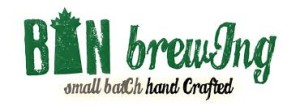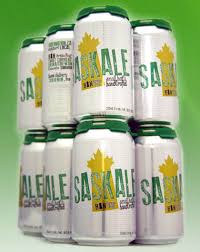 Recently I reported about the spate of new breweries popping up in Saskatchewan. I did a profile on three – District Brewing (here), Black Bridge Brewing (here) and Prairie Sun Brewing (here). At the time I also mentioned a fourth, Bin Brewing also from Swift Current.
Recently I reported about the spate of new breweries popping up in Saskatchewan. I did a profile on three – District Brewing (here), Black Bridge Brewing (here) and Prairie Sun Brewing (here). At the time I also mentioned a fourth, Bin Brewing also from Swift Current.
After some delays, I finally got a chance to ask some questions with Calvin Vosper, Plant Manager for Bin, to get a better sense of what is happening for them. As I write this the first batch of each of their two mainstay beer are rolling out of the brewery. The first is SaskAle, a copper ale with a light grainy note. SaskBerry is a light ale brewed with Saskatoons and raspberries.
As you can immediately tell by the beer names, local identity is important to Bin Brewing. As Vosper, suggests “we really want to support local, whether it be agricultural products, equipment manufacturers or trade persons”. And they mean it. They sourced their brewing equipment in Canada, rather than go with Chinese-made, despite what they say is a 30-40% price difference. The fruit are locally grown and they have plans to use Saskatchewan honey as well. Bin’s goal is to “add value to Saskatchewan agricultural products”. They take great pride in reporting that every single item in their brewery is Canadian made.
 Bin has opted to package their beer in cans, arguing they are sturdier, more lightweight and cheaper to produce and ship. Plus, they saw it as a opportunity to put a Saskatchewan stamp on their product. They designed the cans to look like grain bins. “We wanted a can design that could be quickly identified as a prairie symbol. What better prairie icon then a grain bin?” asks Vosper.
Bin has opted to package their beer in cans, arguing they are sturdier, more lightweight and cheaper to produce and ship. Plus, they saw it as a opportunity to put a Saskatchewan stamp on their product. They designed the cans to look like grain bins. “We wanted a can design that could be quickly identified as a prairie symbol. What better prairie icon then a grain bin?” asks Vosper.
You can’t tell from the photo I found, but the cans are striped like the corrugation on steel grain bins. The label clearly identifies the beer’s origin.
As for the stuff inside, I have not yet had a chance to try them, but Vosper acknowledges they are not hop bombs. “Saskatchewan residents like predominately Pilsner and Lager style beers”, meaning they didn’t want to stray too far at first. They also acknowledge Paddock Wood’s place in the market and do not want to directly compete with them by brewing similar beer. Vosper says they will “introduce new flavors and styles to Saskatchewan residents” but with an eye to ingredients found in the province, such as honey.
Vosper says Swift Current is an ideal location for a craft brewery as “it is a hub and agricultural center for southwest Saskatchewan” and offers easy transportation links. They also like that Swift Current is small but growing, creating ample opportunity for a new business.
Bin Brewing has actually been in the works for six years. They bought an abandoned creamery in 2007, but had to clear many hurdles to finally get to the stage where they can truck beer out of their bay doors. First, the building was in need of significant and substantial overhaul. Then the recent SLGA policy review resulted in a disappointing non-change in mark-up policy (read about it here) forced the fledgling brewery to scale back its plans, which led to the loss of some investors. The issue here was that their initial business plan was to produce 20,000 hL, but with mark up rates jumping significantly at 5,000 hL production, that size of operation became cost prohibitive. Now they hope to expand more slowly, allowing for revenue streams to counter-act the mark-up rates.
Sooner rather than later, additional beer will be added to the line-up, including the aforementioned honey beer and a stronger, more assertive ale. Obviously Saskatchewan is their primary target, but Bin does have plans to expand to Alberta in the near future.
That makes four new breweries in a year. Saskatchewan beer lovers have some sampling to do!


March 22, 2014 at 4:54 PM
Hi. I live in Regina and am wondering where I can buy your beer
March 25, 2014 at 10:03 AM
Tyler,
I don’t work for the brewery, just to be clear. However, the SLGA has a good online database that you can search to see which stores are carrying their beer. Here is the link: http://www.saskliquor.com/SaskLiquorWeb/Home.aspx